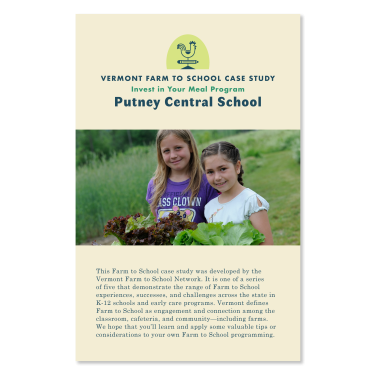What's Happening with the Farm to School Movement in Vermont?

A 2017 survey indicated that more than half of the state’s K-12 schools are integrating Farm to School programming into their cafeterias, classrooms, and communities! Especially in Vermont, schools are part of an interconnected system involving children, families, businesses, farms, distributors, and the broader community. Farm to School is not an add-on, but a mechanism for achieving school goals while improving the health and wellness of students, schools, and communities. This case study serves as tangible inspiration in recognizing there is not only one path to integrating a farm to school program at a school or early care site.
Putney Central School sits on 13 acres surrounded by 160 acres of rolling woods. It’s nestled next to a historic village that supports maple sugar houses, apple orchards, vegetable and fruit farms, and artisans. Putney’s eclectic culture permeates the elementary school and integrates community values into the curriculum and daily life of students. It has had an active parent and teacher group over the years that has built a garden and invested in providing local food for the students and school community.
This series of case studies is a project of the Vermont Farm to School Network, University of Vermont Extension, and Vermont FEED.
We invite you to read the full report below, and/or download the report by filling out the fields further below.